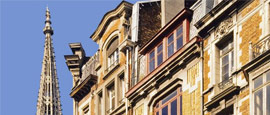Lille History
It’s safe to say that Lille has had a stormy history, thanks in no small part to the 11 separate occasions on which it has been the subject of a siege. That it should have been attacked so frequently becomes all the more astonishing when you realise that it was only founded in 1030.
Known in its early years as L’Isle, the city’s island location made it an ideal defensive position, something the Counts of Flanders soon noticed. Its new castle brought trade and Lille quickly expanded until it became the capital of Flanders. Its capital status was not to last, however, and when Lille became part of France in 1312, it was superseded by Paris.
Nevertheless, the city continued to grow under the stewardship of the Dukes of Burgundy, most of whom revelled in the nickname, ‘the Bold’. So powerful were the Burgundian dukes that one, Philip the Good, who ruled the city in the 1440s, was considered even more powerful than the King of France.
With the death of the last Burgundian duke, Charles the Bold, in 1477, Lille became part of the Holy Roman Empire and from there, passed into Spanish hands. But by 1667, Lille was once more part of France with its delighted conqueror, Louis XIV, lavishing money on the city.
Several sieges, two revolutions and a rebellion later and much of the lustre had gone from the city, although a textile boom initiated under Napoleonic rule helped compensate. However, much of that hard work was destined to be undone by the invading Germans during WWI who first bombarded, then burned down, parts of the town.
The city was also besieged by Hitler’s forces 20 years later and, for the duration of the war, it found itself ruled as part of Belgium by the Nazi regime. Like most European cities, it suffered a decline in manufacturing after the war but reinvented itself as a hub for the service industries, as well of tourism – both of which are still going strong today.
Did you know?
• Lille Cathedral, the Basilica of Notre Dame de la Treille, is named after a medieval statue of the Virgin Mary, which is associated with various miracles.
• The world’s first entirely driverless underground transit system was inaugurated in Lille in 1983.
• France’s most famous president, Charles de Gaulle, was born in Lille.
Do you have any Feedback about this page?
© 2026 Columbus Travel Media Ltd. All rights reserved. No part of this site may be reproduced without our written permission, click here for information on Columbus Content Solutions.




 You know where
You know where